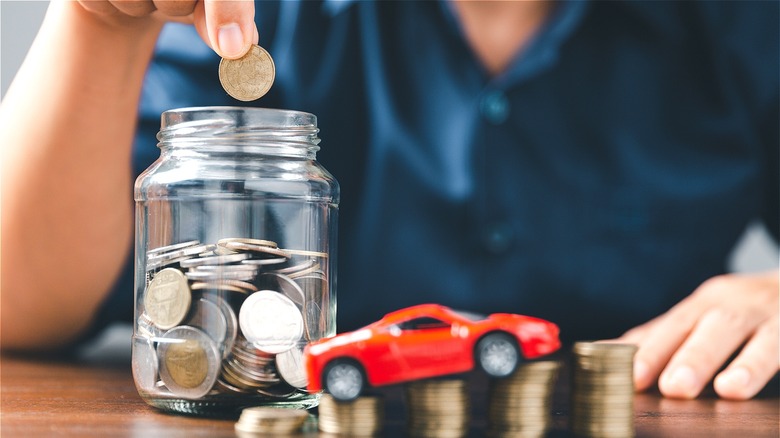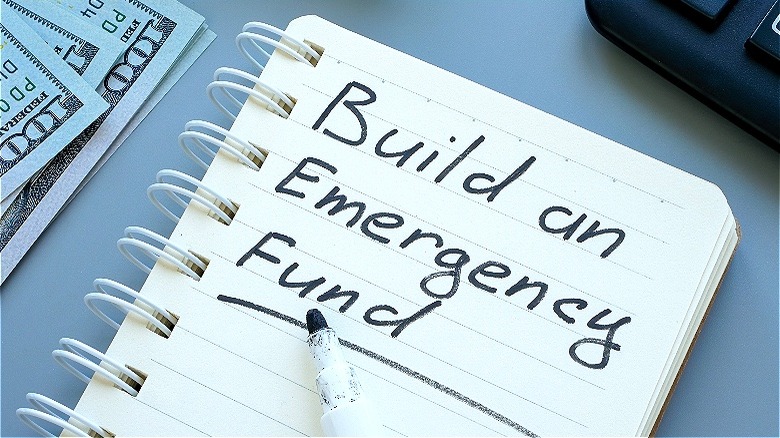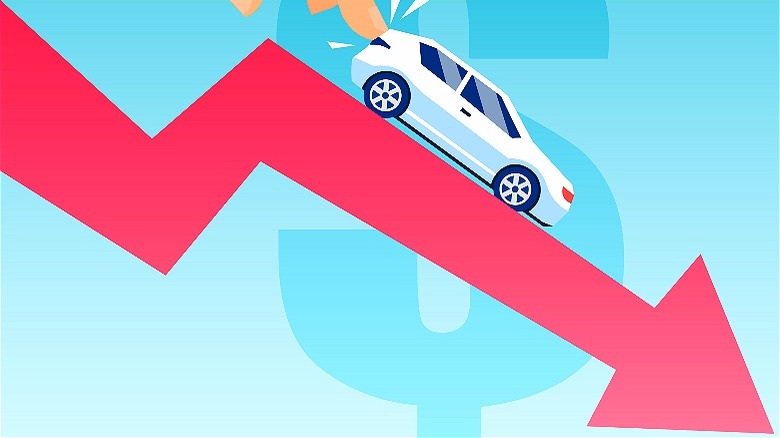Is Paying Off A Car Loan Early A Good Strategy? Here's The Truth
When it comes to deciding whether to pay off a debt or spend the money elsewhere, sometimes the decision is a no-brainer. For example, credit card debt, which regularly carries interest rates of 25% or more and should be eliminated as quickly as possible. However, whether you should rush to pay your loan off early isn't as black and white. To be clear, paying your auto loan off early could take the form of making extra payments periodically to shorten the term. Alternatively, you could also opt to pay the entire balance off in one fell swoop if you have the necessary funds.
In either case, that decision could largely depend on your loan's interest rate and whether there are more urgent uses for your spare cash. Until recently, like circa 2022, auto loan interest rates were fairly low. For example, the average interest rate for a 60-month auto loan hovered around 5% for most of the decade between 2010-20, according to the Federal Reserve Bank of St. Louis. In some cases, auto manufacturers offer special loan rates to increase the sale of a particular make or model vehicle. Those promotional rates can be even lower than the market rates, as low as 0%, in fact.
If you have a car loan from the era of lower and/or promotional interest rates, there's certainly no sense of urgency to pay it off ahead of time. With that said, doing so could still make sense in some instances. Let's investigate.
Make sure other financial obligations take priority
When considering what type of debt to pay off first, it's financially prudent to start with loans that carry the highest interest rates or else it could cost you extra money. As well, you'll want to build an emergency fund containing several months worth of living expenses for life's unexpected surprises. Finally, you should be vigilant about investing for retirement via contributions into an IRA or 401(k). Contributing to a retirement account is particularly important if your employer offers the perk of matching your contribution dollar-for-dollar up to a certain point. That's literally free money.
However, if you've already taken care of the other priorities mentioned above and still have some extra cash left over, there are several advantages to paying your car loan off early. To begin, you'll save money on interest that would normally just be a profit point for the lender. Having a loan-free vehicle will also make it easier to sell if you ever need to. Plus, you'll have more flexibility to select the appropriate auto insurance policy for your needs, not simply what the lender requires.
It's easier to sell or trade in a paid-off car
When you decide to finance your car, truck, or SUV, a lien is typically created. This lien is a legal claim that's designed to protect the lender and gives them permission to repossess the vehicle if the borrower fails to make timely payments. Sometimes, a lender will retain the title (that is, proof of ownership) to the vehicle, while other times, the vehicle's owner will receive the title. However, in either case, the car title will have a lienholder listed on it, which prevents selling or trading of the vehicle without the lien being removed via full repayment of the loan.
Car dealerships are used to dealing with vehicle trade-ins that still have a lien on the title and can accommodate the transaction with little fuss. However, if you're attempting to sell your car yourself to a private party, the lack of a clear title (without liens) can be somewhat intimidating to potential buyers. That's because either the buyer or seller will need to repay the lienholder the balance of the loan, which will release the title. However, the process can take a surprisingly long time; like several weeks in a worse case. During that waiting period, the buyer may not be able to register their new vehicle without the clear title.
You could stay ahead of depreciation
Besides making for a potentially easier sales transaction, owning your vehicle outright also means you can select the type of insurance coverage that's appropriate for your needs. Often, lenders require car insurance that considerably exceeds the required minimums for your state. By owning outright, you can opt to decline some of these optional coverages, like gap insurance. You can also adjust the deductibles to your comfort level, though you'll still want to maintain adequate protection.
Paying your auto loan off more quickly also reduces your chances of being "upside down." That is, creating a negative equity scenario where your car is worth less money than you owe. For example, a vehicle with a trade-in value of $25,000 and a loan balance of $35,000. If selling or trading-in that vehicle, you'll need to either pay the shortfall ($10,000 in our example) out of your own pocket or potentially roll the difference into your new car loan.
Bundling negative equity into your new loan is a particularly bad practice because it'll create an instant upside-down situation on your new car, perpetuating this bad money habit. By making extra payments, you'll have a better chance of staying ahead of your vehicle's depreciation curve.
Potential downsides do exist
There really aren't any massive negatives about paying off an auto loan early, but there are a couple "gotchas" to be cautious of. Probably the biggest hazard is if you could put the money to better use elsewhere. Yes, you'll save on paying some interest on your auto loan (along with the other benefits discussed above), but you shouldn't do so at the expense of ignoring other debt with higher interest rates. As well, consider if you should be investing the money instead — especially if your auto loan interest rate is low compared to current ambient rates.
It might seem counterintuitive, but paying off your car loan could also cause your credit score to dip (by the way, what's considered a bad credit score?). Instead of being rewarded for your good habits, credit agencies may focus on the disappearance of an installment loan — perhaps your only one — as a negative event. However, rest assured that any negative implication to your credit score will be both small and temporary.
Finally, you'll want to double-check your lender doesn't charge a prepayment penalty for satisfying the loan early. Fortunately, few lenders actually charge a prepayment penalty nowadays, but it's still a remote possibility. If so, you'll want to evaluate whether paying the prepayment penalty is worth the expense relative to how much money you'll spend on interest if the auto loan is allowed to go to the end of its term.




